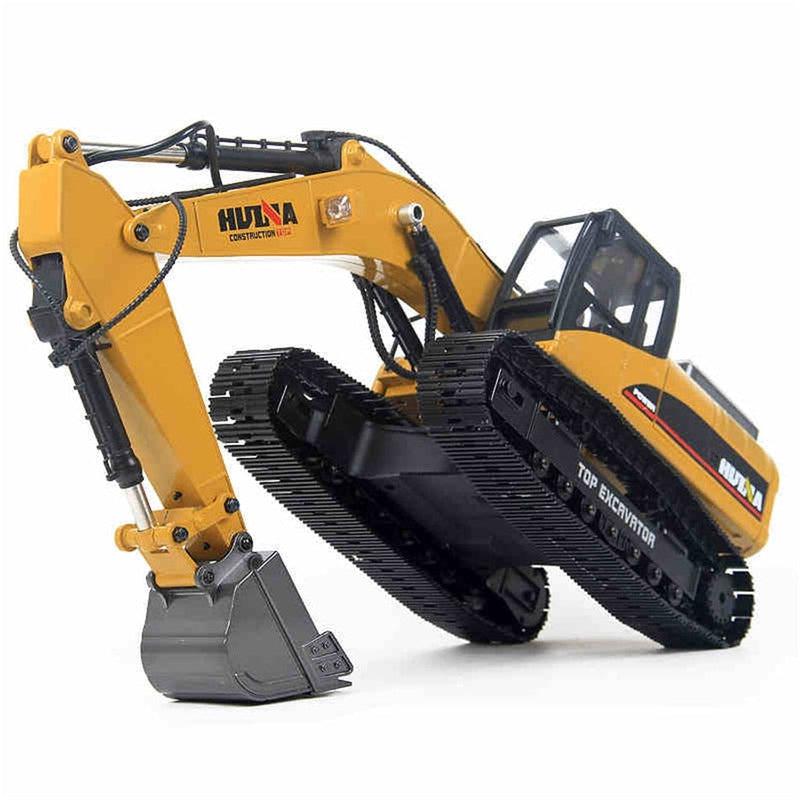The Best Practices for Operating a rc excavator in Urban Spaces
Wiki Article
Comprehending Just How Excavator Works and Its Influence on Effectiveness
Excavators play an important duty in construction and mining procedures, depending on an intricate interplay of mechanical and hydraulic systems. Their capability to execute a variety of jobs rests on both their style and the modern technology integrated within. Recognizing these components can considerably influence operational effectiveness and performance. As developments remain to reshape the market, one have to think about just how these changes will influence future techniques and performance.The Fundamentals of Excavator Mechanics

The Function of Hydraulic Equipments in Excavators
At the heart of excavator procedure lies the hydraulic system, which plays a pivotal role in powering the equipment's movements and features. This system uses pressurized hydraulic liquid to move energy, allowing different actions such as lifting, moving, and digging. By utilizing the principles of hydraulics, excavators can do tasks with exceptional precision and force, enhancing overall functional efficiency.The hydraulic system includes crucial elements, consisting of valves, cylinders, and pumps, which function with each other to manage the flow and instructions of the liquid. When the operator engages the controls, the hydraulic liquid is directed to specific cyndrical tubes, converting the operator's commands into physical activity. This system permits receptive and smooth actions, which are crucial in building and excavation environments. double e volvo rc excavator. The performance of the hydraulic system straight impacts the productivity and convenience of the excavator, making it an essential component in contemporary excavation processesTrick Components of an Excavator
Recognizing the crucial components of an excavator is crucial for comprehending exactly how this effective maker operates. An excavator is composed of several considerable elements, consisting of the undercarriage, house, bucket, arm, and boom. The undercarriage gives stability and flexibility, typically featuring tracks or wheels to browse various surfaces. The house consists of the engine and hydraulic systems, allowing the operator to regulate movement and power the device. The boom expands from your house, allowing upright reach, while the arm attaches to the bucket, promoting digging and lifting operations.Additionally, the taxicab houses the driver, geared up with controls for exact handling. Each of these components plays an essential duty in the excavator's total functionality, contributing to its effectiveness and performance on building and construction sites. Comprehending these parts assists in keeping and maximizing excavator efficiency, making certain tasks are completed safely and efficiently.Accessory Adaptability and Its Advantages
Add-on versatility is a vital element of excavators, making it possible for drivers to switch over in between numerous devices customized for particular tasks. This versatility not only improves task effectiveness however likewise adds to cost-effectiveness by minimizing the demand for numerous equipments. Understanding the various sorts of add-ons available can substantially influence the total efficiency and performance of an excavator on job websites.Kinds of Add-ons
While excavators are mainly recognized for their digging capacities, their true flexibility depends on the broad range of add-ons available. These attachments improve the excavator's capability, allowing it to execute numerous jobs beyond excavation. Typical accessories consist of pails (for digging and scooping), hydraulic thumbs (for understanding materials), and augers (for drilling openings) Grapples are used for managing and moving particles, while rippers can damage up difficult surface areas. Various other specialized add-ons, such as trenchers and plows, allow excavators to adjust to details task demands. This diversity not just enhances the equipment's utility throughout different sectors, including construction, landscape design, and demolition, yet likewise permits operators to customize their equipment to fulfill particular project needs efficiently.Boosted Job Effectiveness
Making the most of work efficiency is a main benefit of using numerous excavator attachments. Different accessories permit an excavator to carry out several jobs without requiring to switch devices, conserving valuable time and labor. For example, making use of a hydraulic hammer can break concrete while a container add-on can excavate soil, making it possible for a seamless process. This flexibility minimizes downtime related to tools changes and enhances efficiency on-site. Furthermore, specialized accessories boost precision in jobs such as grading or landscape design, leading to higher high quality results. The capability to adjust to different task demands not just streamlines procedures however additionally decreases the demand for added equipment, making certain that tasks are finished promptly and effectively. Overall, add-on convenience substantially adds to raised work efficiency in excavation job.Cost-Effectiveness and Versatility
Cost-effectiveness is a significant advantage of making use of functional excavator accessories. These accessories allow a solitary excavator to do several tasks, decreasing the need for added equipment and labor - double e volvo rc excavator. rc excavator By switching in between pails, hammers, and grapples, drivers can take on different projects, from excavating to demolition, consequently making the most of equipment application. This versatility not only decreases functional costs yet likewise minimizes downtime connected with changing tools. Furthermore, the capability to tailor excavators with specialized attachments boosts performance, as they can successfully deal with diverse jobs according to project needs. In conclusion, the combination of cost-effectiveness and flexibility in excavator accessories adds to boosted functional performance and source appropriation in construction and excavation projects
Advanced Modern Technology in Modern Excavators
Modern excavators are progressively outfitted with innovative modern technology that transforms excavation processes. Automation enhances operations, while boosted gas efficiency minimizes functional prices. Additionally, wise control systems boost precision and security, marking a significant evolution in excavation tools.Automation in Excavation Processes
As excavation modern technology develops, automation has actually arised as an essential component in boosting effectiveness and accuracy on work websites. Modern excavators are outfitted with advanced automated systems that help with jobs such as grading, excavating, and trenching with marginal driver intervention. These systems make use of sensing units, GPS, and device discovering algorithms to ensure precise positioning and depth control, substantially lowering the margin for mistake. In addition, automation enables drivers to focus on strategic decision-making rather than hand-operated controls, bring about enhanced productivity overall. Such innovations not only simplify process however additionally boost safety and security by minimizing human error in complex operations. As a result, the integration of automation in excavation procedures represents a considerable innovation in construction innovation, driving the market in the direction of better efficiency and effectiveness.Enhanced Fuel Efficiency
Improvements in modern technology have also resulted in considerable enhancements in fuel efficiency for contemporary excavators. Modern machines are geared up with advanced engines that optimize power result while decreasing fuel consumption. These engines utilize innovative burning modern technologies, such as turbocharging and straight gas shot, to boost performance and performance. In addition, lightweight products in construction lower total weight, enabling less power expenditure throughout operation. The intro of variable rate controls allows operators to change engine efficiency according to certain jobs, even more decreasing fuel usage. Consequently, these enhancements not just lower operational expenses however also contribute to environmental sustainability by minimizing emissions. On the whole, enhanced gas efficiency in excavators is an essential advancement that bolsters efficiency and economic viability in the building and construction sector.Smart Control Systems
While operators navigate progressively complex work websites, smart control systems in excavators have actually emerged as crucial devices for boosting effectiveness and precision. These sophisticated technologies make use of formulas and sensors to monitor numerous criteria such as lots weight, surface conditions, and operational performance. By automatically changing hydraulic functions, clever systems optimize machine efficiency, resulting in boosted efficiency and reduced endure components. Additionally, operators gain from intuitive user interfaces that offer real-time feedback and diagnostics, permitting notified decision-making. This assimilation of modern technology not just simplifies procedures yet likewise reduces human mistake, adding to much safer job atmospheres. As the building sector remains to progress, clever control systems will play a crucial function fit the future of excavator performance and efficiency.Enhancing Operational Performance With Excavators
Excavators play an important duty in enhancing functional performance throughout different construction and excavation tasks. Their adaptability enables numerous tasks, consisting of product, lifting, and digging handling, which streamlines workflows and reduces the requirement for additional devices. With effective hydraulic systems, excavators can execute sturdy tasks with accuracy, considerably reducing the moment required to full projects. The assimilation of innovative technology, such as GPS and automated controls, additionally optimizes their operation, enabling drivers to achieve higher accuracy and minimize material waste. Furthermore, contemporary excavators are designed to take in less fuel and decrease discharges, adding to both cost savings and environmental sustainability. By utilizing excavators successfully, building teams can enhance efficiency, fulfill task deadlines, and enhance overall site management. This multifunctionality and efficiency make excavators vital devices in the modern-day building and construction landscape.The Future of Excavators in Building and Mining Industries
As the building and mining markets develop, the future of excavators is poised for substantial change driven by technological innovation and altering operational needs. Developments in automation and fabricated intelligence are improving excavator capabilities, permitting for improved precision and performance in procedures. Autonomous excavators are emerging, minimizing the need for human treatment and minimizing the danger of accidents.Moreover, the integration of telematics and IoT modern technology makes it possible for real-time tracking of device efficiency and anticipating upkeep, optimizing uptime. Environment-friendly styles, including hybrid and electric designs, are obtaining grip, straightening with sustainability goals within the industry.Additionally, using sophisticated materials and lighter layouts improves fuel performance while preserving efficiency requirements. As these trends development, excavators will certainly play a crucial duty in meeting the increasing demands for performance and security in building and mining, ultimately changing operational landscapes.Often Asked Inquiries
Exactly How Do Climate Problems Impact Excavator Efficiency?

Climate condition substantially affect excavator performance, as rain and mud can hinder grip and security, while extreme temperatures might impact hydraulic systems. Operators should adapt to these variables to assure suitable performance and safety throughout procedures.
What Precaution Should Operators Comply With While Using Excavators?
Precaution for excavator operators consist of using appropriate individual protective tools, carrying out pre-operation evaluations, guaranteeing proper interaction with ground workers, keeping a risk-free distance from above risks, and sticking to recognized functional procedures to prevent mishaps.Exactly How Typically Should Excavators Be Maintained for Ideal Efficiency?
Excavators must be maintained consistently to ensure peak efficiency, generally every 250 operating hours or as defined by the producer. Regular checks improve integrity, avoid unanticipated failures, and extend the life expectancy of the equipment.
What Is the Typical Life Expectancy of an Excavator?
The ordinary lifespan of an excavator normally varies from 10,000 to 15,000 hours of operation. Elements affecting long life include maintenance methods, running problems, and the quality of the device itself, affecting total performance and performance.
Can Excavators Operate Uneven Surface Efficiently?
Excavators can run effectively on unequal surface due to their verbalized layouts and adjustable tracks. These attributes allow them to preserve security and traction, allowing reliable operation in difficult settings typically come across in construction and landscaping jobs. Each of these components plays a crucial duty in the excavator's overall performance, adding to its performance and effectiveness on building websites. Maximizing job effectiveness is a key benefit of utilizing various excavator accessories. While drivers navigate increasingly complicated task websites, clever control systems in excavators have actually arised as essential tools for enhancing effectiveness and precision. Excavators play a crucial duty in boosting operational efficiency throughout numerous construction and excavation projects. Advances in automation and synthetic intelligence are reshaping excavator capabilities, allowing for enhanced precision and efficiency in operations.Report this wiki page